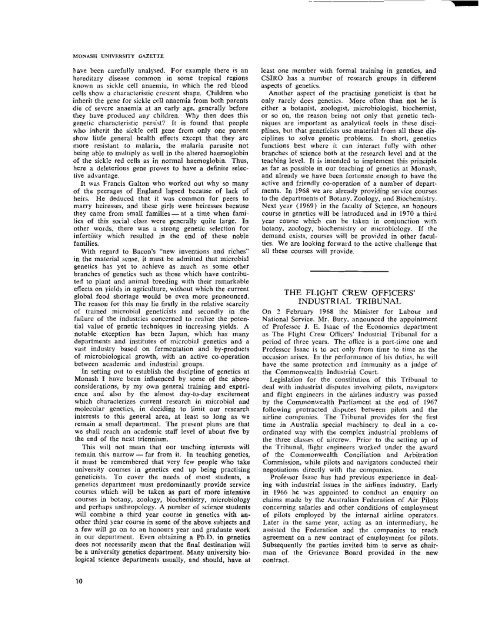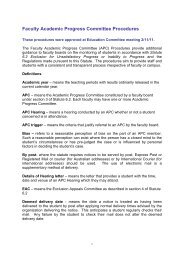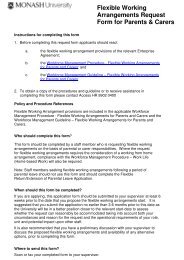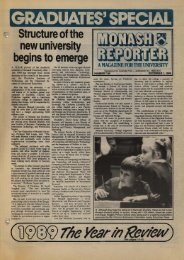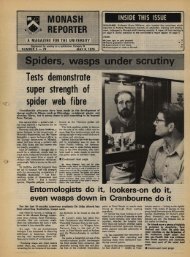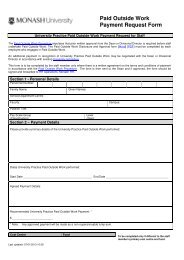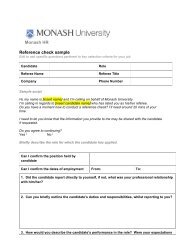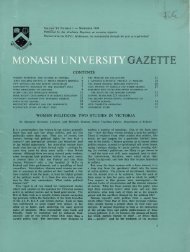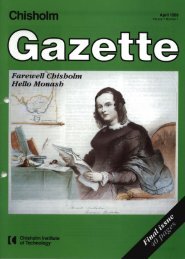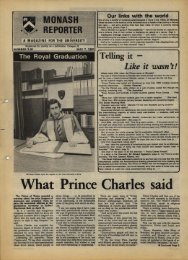GAZETTE - Adm.monash.edu.au - Monash University
GAZETTE - Adm.monash.edu.au - Monash University
GAZETTE - Adm.monash.edu.au - Monash University
- No tags were found...
Create successful ePaper yourself
Turn your PDF publications into a flip-book with our unique Google optimized e-Paper software.
MONASH UNIVERSITY <strong>GAZETTE</strong>have been carefully analysed. For example there is anhereditary disease common in some tropical regionsknown as sickle cell anaemia, in which the red bloodcells show a characteristic crescent shape. Children whoinherit the gene for sickle cell anaemia from both parentsdie of severe anaemia at an early age, generally beforethey have produced any children. Why then does thisgenetic characteristic persist? It is found that peoplewho inherit the sickle cell gene from only one parentshow little general health effects except that they aremore resistant to malaria, the malaria parasite notbeing able to multiply as well in the altered haemoglobinof the sickle red cells as in normal haemoglobin. Thus,here a deleterious gene proves to have a definite selectiveadvantage.It was Francis Galton who worked out why so manyof the peerages of England lapsed bec<strong>au</strong>se of lack ofheirs. He d<strong>edu</strong>ced that it was common for peers tomarry heiresses, and these girls were heiresses bec<strong>au</strong>sethey came from small families - at a time when familiesof this social class were generally quite large. Inother words, there was a strong genetic selection forinfertility which resulted in the end of these noblefamilies.With regard to Bacon's "new inventions and riches"in the material sense, it must be admitted that microbialgenetics has yet to achieve as much as some otherbranches of genetics such as those which have contributedto plant and animal breeding with their remarkableeffects on yields in agriculture, without which the currentglobal food shortage would be even more pronounced.The reason for this may lie firstly in the relative scarcityof trained microbial geneticists and secondly in .thefailure of the industries concerned to realize the potentialvalue of genetic techniques in increasing yields. Anotable exception has been Japan, which has manydepartments and institutes of microbial genetics and avast industry based on fermentation and by-productsof microbiological growth, with an active co-operationbetween academic and industrial groups.In setting out to establish the discipline of genetics at<strong>Monash</strong> I have been influenced by some of the aboveconsiderations, by my own general training and experienceand also by the almost day-to-day excitementwhich characterizes current research in microbial andmolecular genetics, in deciding to limit our researchinterests to this general area, at least so long as weremain a small department. The present plans are thatwe shall reach an academic staff level of about five bythe end of the next triennium.This will not mean that our teaching interests willremain this narrow - far from it. In teaching genetics,it must be remembered that very few people who takeuniversity courses in genetics end up being practisinggeneticists. To cover the needs of most students, agenetics department must predominantly provide servicecourses which will be taken as part of more intensivecourses in botany, zoology, biochemistry, microbiologyand perhaps anthropology. A number of science studentswill combine a third year course in genetics with anotherthird year course in some of the above subjects anda few will go on to an honours year and graduate workin our department. Even obtaining a Ph.D. in geneticsdocs not necessarily mean that the final destination willbe a university genetics department. Many university biologicalscience departments usually, and should, have atleast one member with formal training in genetics, andCSIRO has a number of research groups in differentaspects of genetics.Another aspect of the practising geneticist is that heonly rarely does genetics. More often than not he iseither a botanist, zoologist, microbiologist, biochemist,or so on, the reason being not only that genetic techniquesare important as analytical tools in these disciplines,but that geneticists lise material from all these disciplinesto solve genetic problems. In short, geneticsfunctions best where it can interact fully with otherbranches of science both at the research level and at theteaching level. It is intended to implement this principleas far as possible in our teaching of genetics at <strong>Monash</strong>,and already we have been fortunate enough to have theactive and friendly co-operation of a number of departments.In 1968 we are already providing service coursesto the departments of Botany, Zoology, and Biochemistry.Next year (1969) in the faculty of Science, an honourscourse in genetics will be introduced and in 1970 a thirdyear course which can be taken in conjunction withbotany, zoology, biochemistry or microbiology. If thedemand exists, courses will be provided in other faculties.We are looking forward to the active challenge thatall these courses will provide.THE FLIGHT CREW OFFICERS'INDUSTRIAL TRIBUNALOn 2 February 1968 the Minister for Labour andNational Service. Mr. Bury, announced the appointmentof Professor 1. E. Isaac of the Economics departmentas The Flight Crew Officers' Industrial Tribunal for aperiod of three years. The office is a part-time one andProfessor Isaac is to act only from time to time as theoccasion arises. In the performance of his duties, he willhave the same protection and immunity as a judge ofthe Commonwealth Industrial Court.Legislation for the constitution of this Tribunal todeal with industrial disputes involving pilots, navigatorsand flight engineers in the airlines industry was passedby the Commonwealth Parliament at the end of 1967following protracted di-sputes between pilots and theairline companies. The Tribunal provides for the firsttime in Australia special machinery to deal in a coordinatedway with the complex industrial problems ofthe three classes of aircrew. Prior to the setting up ofthe Tribunal, flight engineers worked under the awardof the Commonwealth Conciliation and ArbitrationCommission, while pilots and navigators conducted theirnegotiations directly with the companies.Professor Isaac has had previous experience in dealingwith industrial issues in the airlines industry. Earlyin 1966 he was appointed to conduct an enquiry onclaims made by the Australian Federation of Air Pilotsconcerning salaries and other conditions of employmentof pilots employed by the internal airline operators.Later in the same year, acting as an intermediary, heassisted the Federation and the companies to reachagreement on a new contract of employment for pilots.Subsequently the parties invited him to serve as chairmanof the Grievance Board provided in the newcontract.10


